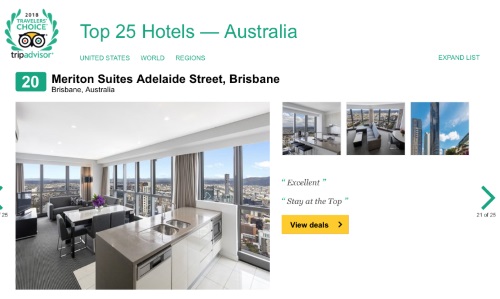
Firm fined for misleading consumers on TripAdvisor but still makes it into Top 25
By cameron in Uncategorized
A consumer protections case against Australian serviced apartments operator and developer Meriton has concluded with the Federal Court fining the company AU$3 million (US$2.2 million) for deceptive practices.
The case centres around masking customer emails in an attempt to game the TripAdvisor Review Express system.
Review Express is intended to help travel brands build their reputations by making it easier for customers to post reviews through follow-up email requests. Properties can set up Review Express campaigns by managing customer addresses on a spreadsheet for up to 1,000 customers to send as a mail campaign.
While Review Express is an optional service, it can, according to TripAdvisor result in a 28% uplift of the number of reviews a property collects, helping build reputation.
However, while Meriton wanted to benefit from a greater number of reviews, the company wanted to minimize the risk of negative reviews. Meriton staff began to mask the email addresses of guests who might be likely to leave negative feedback so that their Review Express emails would never reach those customers.
The Sydney Morning Herald, which reported on the ACCC finding against Meriton in November of 2016, shared details of the ACCC’s statement of claim which showed that, on November 20, 2014, Meriton’s administration co-ordinator sent an email to staff and managers of Meriton properties stating:
“In order to ensure complaints are not carried onto TripAdvisor, I strongly recommend that each property add a ‘Emel! MSA’d’ column in their duty log spreadsheet […] Of course this won’t eliminate negative reviews completely, but at least it will streamline masking guest bookings more effectively and capture all guests who have recorded a complaint … MSA Kent Street have recently implemented this showing great results with their reviews so I wanted to share it across properties as well.”
The “MSA” stood for Meriton Serviced Apartments. The company streamlined the practice by adding a “TA Mask” field to their bookings management system which automatically added “MSA” to a customer’s email address, according to ITnews, and instructed staff to withhold email addresses of guests in cases of major service disruption at the property such as when elevators weren’t working or when there was no hot running water in the property.
Meriton applied this email masking practice on a weekly basis from November of 2014 to October of 2015.
In November of last year, the Federal Court of Australia ruled that Meriton’s practices constituted “misleading or deceptive conduct”.
In a statement to CNN, TripAdvisor said it took action to investigate and address the issue and that Meriton was “banned from filtering, selecting or limiting the addresses it provides to TripAdvisor for three years.” The company was also required “to create a compliance and training program for its staff.”
The company still touts the status of Meriton Serviced Apartments as a “2015 TravelersChoice” winner on its website which co-incides with the timing 0f the masking scandal.
And at the time of writing, four Meriton properties still appear on TripAdvisor among the Top 25 Hotels in Australia listed in the 2018 Travelers’ Choice Awards.
Gaming of reviews is a constant issue for TripAdvisor, which talks the talk in terms of doing everything it can to stop this from happening. But perhaps banning properties from being listed in any recognitions or award rankings, after being found to game the system, would discourage such practices in future. As things stand, Meriton is still seeing the benefits of having great reviews on TripAdvisor, despite the Australian regulator’s unequivocal statement it was “misleading consumers.”
![]()

